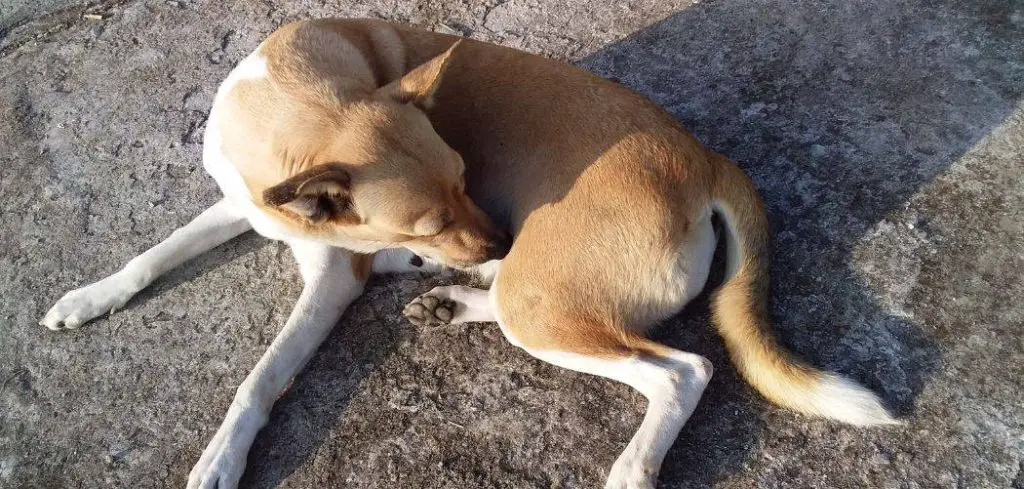If your dog keeps licking its anus and there’s a foul odor, it can be distressing and unpleasant to deal with. This behavior is often a sign that something is wrong with your dog’s anal glands, skin, or digestive health.
We outline the common reasons why a dog keeps licking its anus and it smells, what you can do at home, and when to seek veterinary help.
Dog Keeps Licking Anus and It Smells — Why It Happens
When a dog persistently licks its anus and a bad smell is present, it usually points to anal gland issues, infections, or irritation. Dogs have anal glands that naturally release scent, but if they become impacted or infected, the odor can be overwhelming. Other causes include parasites like worms, skin infections around the anus, or digestive problems leading to irritation.
Sometimes grooming issues or allergies may also play a role in the discomfort and odor.

Dog Keeps Licking Anus and It Smells: Common Causes
Anal Gland Impaction
Dogs have small sacs on either side of their anus that release scent when they defecate. If these glands don’t empty properly, they can become impacted. This leads to swelling, discomfort, and a strong fishy or foul odor.
A dog with impacted anal glands often scoots along the floor, licks excessively, and may even show signs of pain when sitting. Left untreated, impaction can lead to infection or abscesses.
Read more: Dog Keeps Licking Anus After Grooming (What it means and what to do)
Anal Gland Infection or Abscess
When anal glands remain blocked, bacteria can build up inside, causing an infection. This results in swelling, redness, and sometimes pus-filled abscesses. The odor is usually very strong and offensive.
Infected glands can rupture, causing pain and bloody or foul-smelling discharge. This is a veterinary emergency that requires immediate treatment to prevent complications.
Parasites (Worms)
Worms, especially tapeworms, can cause itching and irritation around the anus. Dogs may lick or bite the area to relieve discomfort, and in some cases, worms or their egg segments can contribute to odor.
If you notice rice-like particles near your dog’s anus or in their feces, parasites may be the cause. Regular deworming and parasite prevention are important to avoid this problem.
Skin Infections or Irritation
Moisture, bacteria, and yeast can cause infections in the folds of skin around a dog’s anus, especially in breeds with loose skin. These infections lead to odor, redness, and itching, prompting constant licking.
Sometimes grooming issues, such as untrimmed fur collecting fecal matter, can make the problem worse. The smell in these cases can be extremely strong and unpleasant.
Allergies and Digestive Issues
Food allergies or sensitivities may cause digestive upset that irritates the anal area. Dogs with chronic diarrhea or soft stools are more likely to develop anal gland issues or skin irritation.
Allergies can also lead to itchy, inflamed skin that makes a dog lick more often, sometimes producing a bad odor if secondary infections develop.
What to Do If Your Dog Keeps Licking Its Anus and It Smells
If your dog won’t stop licking its anus and a bad odor is present, there are a few things you can try at home while monitoring the situation.
Gently check the area to see if there is swelling, redness, or discharge. A warm compress may help soothe mild irritation, but never try to squeeze or express anal glands on your own unless you have been shown how by a vet.
Maintaining good hygiene can help reduce odor. Regular grooming around the anus and keeping the area clean prevents buildup of fecal matter.
Providing a high-fiber diet may also help some dogs naturally empty their anal glands.
If worms are suspected, an over-the-counter dewormer may help, but it’s always best to get a stool test at the vet for accurate treatment. Probiotics and dietary adjustments may also support digestive health and reduce irritation around the anus.
Monitor your dog closely. If symptoms persist, worsen, or if your dog appears to be in pain, veterinary care is essential.
When to Call or Visit Your Vet
If your dog’s anus is swollen, bleeding, or producing pus, you should contact your vet immediately. These are signs of infection or abscess that require professional treatment.
Sudden onset of a strong, fishy odor is also a clear indicator of anal gland issues that a vet needs to address.
Persistent licking despite cleaning and dietary adjustments is another reason to seek help. If your dog shows signs of distress such as whining, scooting, or struggling to defecate, veterinary evaluation is needed.
Finally, if parasites are suspected, your vet can run tests and prescribe the correct dewormer. Ignoring worms can lead to more serious health problems over time.
Read more: Dog Excessively Licking Privates (Here’s Why)
Key Takeaway
When a dog keeps licking its anus and it smells, it’s often a sign of anal gland issues, parasites, or infections. While some mild cases may improve with hygiene and diet changes, strong odors, swelling, or discharge require veterinary attention.
Being proactive with grooming, regular vet checks, and parasite prevention can help reduce the chances of these uncomfortable issues returning. If you’re ever in doubt, seeking professional veterinary advice is the safest and most caring step you can take for your dog.
